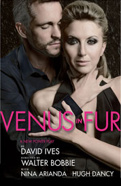Walter Bobbie on How Venus in Fur Became a Sexy Sensation on Broadway
About the author:
Walter Bobbie made the leap from Broadway character actor to superstar director, best known for his Tony-winning reboot of Chicago, which has become the longest-running American musical in Broadway history. Bobbie’s directing credits range from small-scale dramas (including MCC’s recent hit The Submission) to big musicals (Sweet Charity), but one of his most satisfying collaborations has been with playwright David Ives. As Bobbie's striking production of Ives’ erotic drama Venus in Fur prepares to re-open at Broadway’s Lyceum Theatre on February 7, Broadway.com asked him to reflect on their shared theatrical sensibility and the special chemistry between the play’s lauded stars, Nina Arianda and Hugh Dancy.
![]()
When I was named artistic director of Encores! at New York City Center, one of the first writers I asked to edit these classic American musicals was David Ives. He took on the impossible job of turning five different drafts of Cole Porter’s Out of This World into a delightful and witty script. That was in 1995, and since then, we’ve worked together in every permutation, including three play premieres at Classic Stage Company: New Jerusalem, Venus in Fur and The School for Lies. In between, I brought David in to retool the book of White Christmas on Broadway, and he did the librettos for concerts of Carousel and South Pacific at Carnegie Hall.
I joke that David and I connect so well because we both have Polish-Americans ancestors and we were both trained by Jesuits. In truth, what happens between artistic collaborators is inexplicable. But when a relationship works, it’s very clear that you have unspoken trust and that you are creatively unedited with each other. That’s certainly been the case with us.
Venus in Fur is an example of how free and open our collaboration has been. When David first showed me the play, it was a dead-ahead adaptation of Leopold von Sacher-Masoch’s Victorian novella. I told him that I didn’t think it would feel relevant to a contemporary audience and, in fact, that some of the behavior in the novella could be unbearable for an audience to watch. David was not put off by my notes, which another writer might have considered harsh. Six months later, he came back with a script in which he used his initial adaptation as a play-within-the-play for this new, funny, dangerous, contemporary story of an actress auditioning to star in a writer/director’s adaptation of Venus in Fur. What started out as an homage to a classic piece of erotica became a completely original play brimming with wit, references to classic theater and music, as well as an insightful examination of the psychological shifts in power that can define relationships between men and women.
We did several readings of the play with significant actresses who were all wonderful as Vanda, but our casting director, James Calleri, said, “There’s this young woman I want you to meet.” Nina Arianda walked in, and it was just like David's play: Nina was a revelation, and she also made what happens in his play feel authentic. We expected nothing when she entered the room, and then she completely knocked us out. Everyone who has seen her agrees that Nina is a remarkable talent who is emerging as a significant star.
Hugh Dancy loved this play so much that he auditioned to play Thomas in the Broadway production. We saw within seconds the remarkable chemistry between him and Nina. That was crucial, because her first scene is so dynamic, we needed an actor with the confidence and skill to knock that ball across the net back at her, and Hugh really does. Nina and Hugh make the play a complete two-hander. Hugh is also a sophisticated, well-read gentleman, which is something you can’t act. He’s a born man of the theater, and he brings his inherent intelligence to the stage without effort.
People ask if I’m surprised that Venus in Fur became successful enough to move from CSC to Broadway, and now to the Lyceum Theatre for a commercial run. My answer is that I’ve been part of so many remarkable theatrical experiences, I sometimes feel like the “you never know” poster child. I was in the original cast of Grease, and nobody expected that show to become an international hit that we would still be talking about 40 years later. I played Nicely Nicely in the 1992 revival of Guys and Dolls, which had a huge amount of turmoil before opening night. I was handed Encores! and given the opportunity to develop what became an instant addition to the New York City arts calendar. And the revival of Chicago is beyond anyone's wildest dreams. My career has been filled with the surprises that only theater can bring. And that includes Mr. Ives.
When Venus in Fur opened at CSC, there was talk about moving it to Broadway, but that initial attempt fell apart, and I think, for all the right reasons. This isn't the kind of play you can take to a commercial Broadway producer and say, “How about an S&M comedy as a metaphor for power?" No way. We’ve had angels along the way—Brian Kulick at Classic Stage Company, and Lynne Meadow at Manhattan Theatre Club—who helped us feel very protected on this journey. We’ve discovered moments in the play that we feared might be upsetting were, in fact, engaging our audiences more deeply. Women, in particular, connected with a sense of empowerment to the narrative of the play and Vanda’s relationship with Thomas.
I’m delighted that more people will get to see Venus in Fur this spring at the Lyceum because I think David has written a truly original and completely American play. It is as sexy and dangerous as it is hilarious, and that’s rare.
